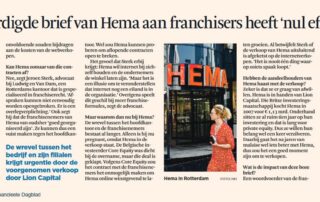Prohibited market/area division in franchise agreements: fines of millions set by the court
On 12 May 2016, the District Court of Rotterdam, ECLI:NL:RBROT:2016:3477, ruled that agreements on exclusive market areas (district division) are prohibited. The fines imposed by the AFM run into the millions, which the court (partly) upholds.
Many franchise agreements include a market division in the sense that each franchisee has been allocated an exclusive territory. Franchisees may then, for example, not make acquisitions in the territories of other franchisees.
Agreements that aim to divide markets have an anti-competitive purpose and are in principle prohibited under Article 6 Mw and Article 101 TFEU. For such agreements, the analysis of the economic and legal context of the practice can therefore be limited to what is strictly necessary to conclude that there is a restriction of competition by object.
An exception to the prohibition may apply to franchise agreements, among other things. This is because franchise agreements qualify for the exemption of Article 6(3) Mw and Article 101(3) TFEU under the conditions set out in the Verticals Block Exemption. This follows, among other things, from Article 12 Mw.
This case concerned agreements that a number of laundries had. The laundries involved set up a subsidiary and each concluded a “franchise agreement” with this subsidiary. The collaboration involved joint purchasing of linen, joint research and development activities, emergency assistance and agreements on exclusive districts.
Although the parties referred to the agreements they entered into with the subsidiary as franchise agreements, the court ruled that this was not the case. The court rules that there are no independent and mutually independent legal entities that have a vertical relationship with each other and are active in other markets. In fact, there are only agreements made between parties active in the same market (the laundries). The subsidiary is not independently active, but only provided services for its shareholders. Those shareholders are precisely the laundries involved. This means that there are in fact horizontal agreements to which the Block Exemption Verticals does not apply, according to the court.
It follows from this ruling, in simplified form, that despite the fact that the parties refer to their cooperation as a “franchise agreement”, there need not be an exemption from the prohibition on market/area division. This applies if the cooperation under a franchise agreement can actually be qualified as a cooperation between the franchisees themselves.
The foregoing also raises the question of how franchise agreements should be assessed in which the franchisees are members of the same cooperative. In such a constellation it may also be possible to judge that there is no de facto vertical relationship, since only the franchisees are members and the cooperative association (the franchisor) only provides services for its members. Market and/or district division could therefore also be prohibited.
mr. AW Dolphijn – Franchise lawyer
Ludwig & Van Dam Franchise attorneys, franchise legal advice.
Do you want to respond? Go to dolphijn@ludwigvandam.nl

Other messages
HEMA in conflict with franchisees about e-commerce agreements
On 18 July 2018, the District Court of Amsterdam, ECLI:NL:RBAMS:2018:5098, rendered a judgment in proceedings on the merits in which the franchisees were largely ruled in favor of e-commerce.
mr. J. Sterk about HEMA conflict in the FD 18 July 2018
mr. J. Sterk about HEMA conflict in the FD.
Column Franchise+ – “Legal Franchise Statistics 2018”
The Legal Franchise Statistics have been compiled for 10 years by Ludwig & Van Dam attorneys on the basis of all published judgments of judges.
Franchisor prohibits opening (franchise) company
A franchisor applied for interim measures to prohibit a franchisee from opening a franchisee's business.
Column Snack courier no. 8: “With 7 steps you comply with the privacy law”
Much has already been written about the General Data Protection Regulation (GDPR). The law has been applicable since 25 May, but many companies have not yet had their privacy policy in order.
Forced to switch to a different franchise formula at the existing location?
If a franchise formula ceases to exist, for example if it is incorporated into another organization, the question may be whether the franchisee is also obliged to be incorporated into







